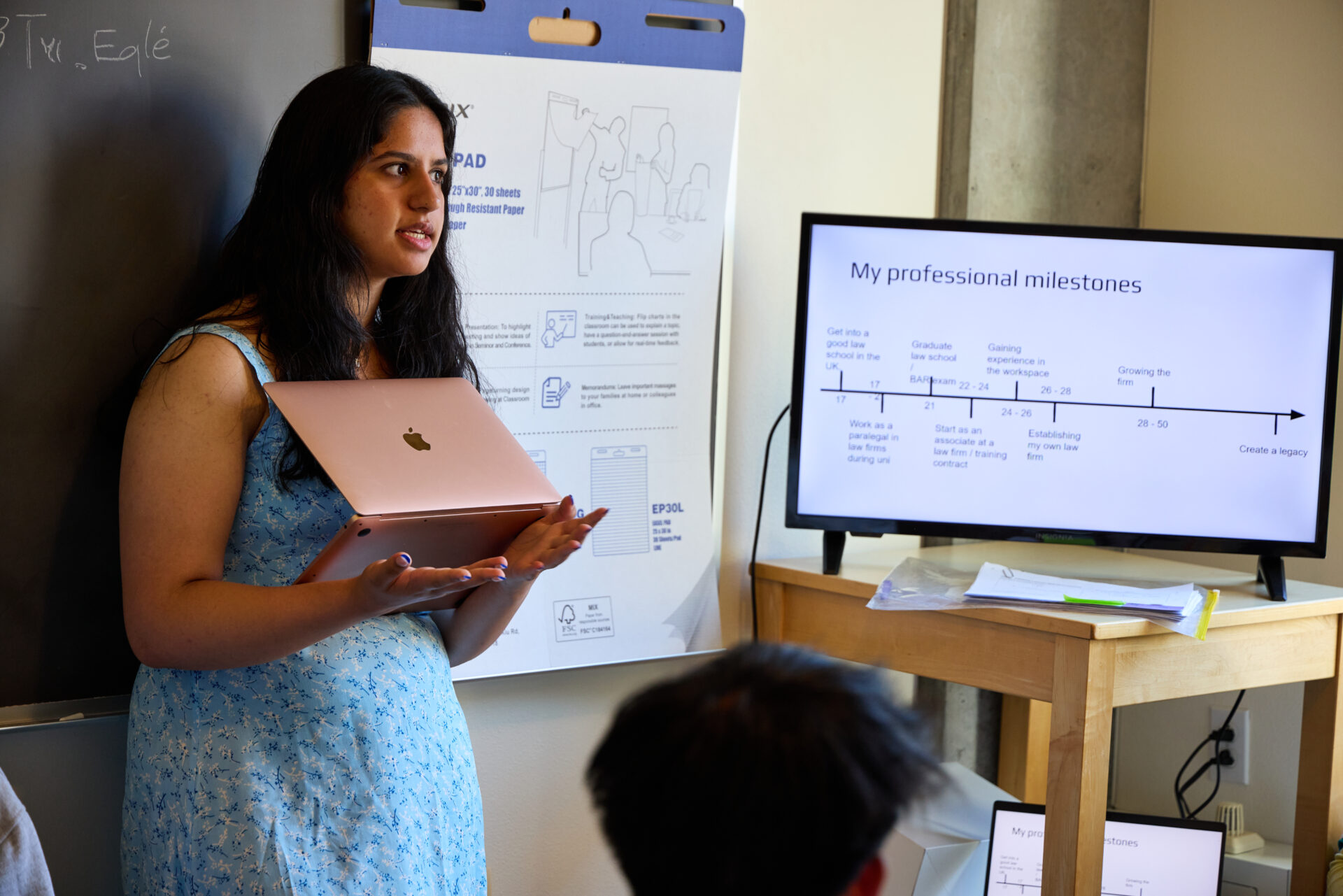Even the most confident speakers feel their hearts race before stepping on stage – you are not alone! The good news is that anxiety doesn’t mean you lack confidence. It means you care deeply about your message and want to share it well. And even better: learning effective public speaking anxiety tips helps you turn nerves into focus and self-assurance.
At our TED Summer School, you’ll explore how world-class speakers transform nervousness into storytelling power and genuine connection with their audience.
Here are some proven tips to help you manage anxiety, build lasting confidence, and speak with calm, authentic presence.
What Causes Public Speaking Anxiety?
Public speaking anxiety is caused by a combination of fear, uncertainty, and physical stress when facing an audience. It happens when your brain interprets being observed as potential judgment, which triggers a rush of adrenaline, a racing heart, and shaky hands.
Research by Farhan Raja (2017) found that about 75 percent of undergraduate students experience fear when speaking in public, and half identify a lack of confidence as the main cause. The study also revealed that larger audiences increase anxiety because speakers feel more exposed and self-conscious.
This reaction is a natural response designed to keep you alert in stressful situations. When you focus too much on how you appear rather than what you want to say, your body releases stress hormones that heighten tension but can also boost energy. Learning to recognise this pattern helps you shift that energy from fear to focus.
By understanding these causes, such as fear of judgment, audience pressure, and self-doubt, you can start using public speaking anxiety tips to manage nerves and build genuine confidence.
Understanding the Psychology Behind Stage Fright
You know that moment before speaking when your heart races, your hands shake, and your breathing feels faster? That’s your body’s stress response. Adrenaline rises, sharpening focus and preparing you to perform, even though it feels uncomfortable.
Psychologically, self-conscious thoughts amplify those sensations. You might start thinking about how you sound or what others will think. This focus on yourself convinces your brain you’re in danger when you’re actually safe.
By understanding this reaction, you can manage it more effectively. The same adrenaline that causes tension also fuels alertness and passion. When you see those sensations as signs of excitement rather than fear, you regain control.
At our Psychology Summer School, you study how behaviour, emotion, and cognitive control work together. You learn about emotional regulation and how to reframe anxious thoughts into focus. By aiming for connection instead of perfection, you transform nervous energy into authentic, confident communication.
How to Overcome Public Speaking Anxiety
You can overcome public speaking anxiety by shifting your mindset, preparing effectively, and practising regularly. Confidence grows when you see nerves as a sign of readiness rather than fear. Over time, what once felt intimidating becomes an opportunity to express ideas with clarity and conviction.
Here are some practical ways to manage anxiety and build lasting confidence when you speak.
1. Turn Nerves into Excitement
Anxiety and excitement feel almost identical. Both increase your heart rate and heighten awareness, preparing you to perform. The difference lies in how you interpret those sensations.
In his TED Talk “How I Overcame My Fear of Public Speaking,” Dr. Justin Moseley explains that when you view nervousness as excitement, your mindset shifts from fear to readiness.
At our TED Summer School, you’ll practise this same approach, using guided storytelling and performance exercises to transform adrenaline into energy, confidence, and authentic expression when you speak.
2. Practise in Real Situations
Confidence grows with exposure. The more you practise speaking in real settings, the less intimidating it becomes. Fear fades when the unknown becomes familiar.
TED speaker Danish Dhamani overcame his public speaking anxiety by recording himself, joining clubs, and welcoming feedback. Each real-life experience helped him desensitise fear and build calm focus.
Repeated practice trains your brain to treat public speaking as a routine skill, not a threat, allowing confidence to replace hesitation over time. One of the most effective public speaking anxiety tips is to keep practising in real situations until speaking feels natural.
3. Build Confidence Step by Step
Building confidence in public speaking is like learning to swim. You don’t dive straight into deep water; you start in the shallows, gaining control with every stroke.
The same applies to overcoming anxiety. Begin with small groups, then gradually face larger audiences as your comfort level grows. Each successful attempt teaches your mind that speaking is safe, not threatening.
Over time, these small victories accumulate, replacing fear with familiarity. Step by step, you’ll find yourself standing taller, speaking clearly, and trusting your voice to carry your ideas forward.
4. Stay Grounded Before You Speak
Amy Cuddy’s TED Talk “Your Body Language Shapes Who You Are” highlights that the way you hold yourself can influence how you feel.
Open, grounded postures reduce stress and signal confidence, even before you speak. When nerves rise, take a moment to stand tall, breathe deeply, and plant your feet firmly.
This physical grounding tells your brain you are safe and prepared. As your body settles, your thoughts align, allowing calm focus and natural confidence to take the place of anxiety.
5. Create Your Own Pre-Speech Routine
Having a pre-speech routine helps you find calm before you speak. Simple rituals, like breathing deeply, visualising success, or repeating a short affirmation, give your mind something steady to focus on.
Psychology shows that predictable actions lower anxiety and build confidence through familiarity. Over time, these habits become cues for composure, reminding your body it knows what to do.
Whether it’s stretching, grounding your stance, or putting on your softest pair of lucky socks, your routine becomes a signal of readiness and self-assurance before every presentation.
6. Focus on Connecting with Your Audience
As Maya Angelou once said, “People will forget what you said, but they will never forget how you made them feel.” The same is true in public speaking.
Confidence grows when you shift your attention from performance to connection. Focus on your audience’s needs, not your own nerves. Make eye contact, listen, and respond with intention.
When your purpose is to share, not impress, anxiety eases naturally. Authentic communication begins the moment you stop trying to be perfect and start trying to connect. One of the most powerful public speaking anxiety tips is to think less about performing and more about building a genuine connection with your listeners.
7. Don’t Worry About Being Perfect
Perfection isn’t what makes a great speaker; connection does. Even the most admired TED speakers pause, forget lines, or stumble occasionally.
What matters is how they recover with warmth and focus. Audiences respond to honesty and humanity more than flawless delivery. Accepting imperfection frees you to speak with authenticity.
When you embrace mistakes as part of the process, you replace tension with trust. Confidence grows not from getting everything right, but from showing up as yourself, ready to share something meaningful.
8. Think About What Went Well After Speaking
Reflection turns each speaking experience into progress. Research published in Applied Sciences (2021) found that self-reflection through video playback helps speakers improve performance and reduce anxiety over time.
After you present, take time to recognise what went well before analysing what to improve. This positive focus strengthens confidence and helps your brain associate public speaking with success, not stress.
Each reflection refines your awareness and reinforces that confidence grows through learning, not perfection, making every talk a meaningful step forward.
9. Get Feedback and Keep Learning
Confidence grows faster when you invite feedback from others. Constructive comments highlight both your strengths and areas to improve, helping you succeed with purpose.
After a talk, it can feel like there’s nothing you’d like less than feedback—but that’s when it helps most. Ask one or two specific questions, like “What was clear?” and “What could I tighten?” so people give you useful points, not waffle.
Seek feedback from mentors, peers, or tutors who can offer perspective and encouragement. Learning to listen without defensiveness turns critique into progress.
At our TED summer school, you experience this same process through guided discussions and personalised feedback. Each conversation helps you refine your delivery, expand your ideas, and develop confidence that extends far beyond the stage.
10. Keep Practising to Build Confidence
Every confident speaker you admire once started where you are: nervous, unsure, and learning with every attempt.
Even icons like Brené Brown, Simon Sinek, and Barack Obama became great communicators through persistence and practice. Each rehearsal sharpens focus, steadies the voice, and reduces fear. Repetition turns uncertainty into ease and transforms anxiety into skill.
The more you practise, the more natural confidence feels. Over time, speaking becomes not just something you do, but something you enjoy and master.
Mini Exercise: Calm, Connect, and Speak
Let’s try this together. The goal is to train your body and mind to feel calm before you speak.
- Pause for a moment. Close your eyes and take three slow, deep breaths. Feel your chest rise and fall.
- Ground yourself. Press your feet into the floor and stand tall, shoulders relaxed.
- Visualise connection. Picture someone in the audience who genuinely wants to hear your message.
- Speak with intention. Smile softly and say your first line aloud, focusing on meaning rather than perfection.
- Reflect. Notice how your heartbeat slows and your breathing steadies.
Each time you repeat this, your brain learns that public speaking feels safe, focused, and empowering.
Join the Immerse Education 2025 Essay Competition
Follow the instructions to write and submit your best essay for a chance to be awarded a 100% scholarship.

Learning from TED Speakers’ Approach to Nerves
Even the most accomplished TED speakers still feel nervous. What sets them apart is how they respond. They have learned to turn anxiety into presence and passion.
Many TED speakers openly share how they manage fear. Dr. Justin Moseley reframed it as excitement. Danish Dhamani used practice and feedback to build confidence. Amy Cuddy showed how posture and breath can shift power and calm. Their stories prove that nervousness is not a weakness; it is evidence that you care deeply about your message.
When you observe TED speakers, notice how they pause, breathe, and connect emotionally with their audience. Those moments of stillness transform tension into authenticity.
At Immerse, you follow the same principle. Through reflective workshops and community feedback, you learn that every heartbeat of nervous energy is creative fuel. Anxiety becomes focus. Fear becomes empathy.
Immerse’s learning philosophy of self-growth through practice, reflection, and community mirrors TED’s approach to mastery. You do not eliminate nerves; you evolve alongside them, shaping them into clarity, confidence, and connection.
Putting These Tips into Practice
Reading about public speaking anxiety tips is a powerful first step, but your confidence grows fastest when you practise regularly. Speaking out loud, in real situations, helps you turn theory into habit and nervous energy into control. The more familiar speaking feels, the less power anxiety holds.
At our TED Summer School, you apply these techniques every day through structured speaking exercises, storytelling workshops, and guided feedback. You practise sharing ideas, shaping messages, and responding to an audience in a supportive setting.
With repetition and reflection, you begin to trust your voice, connect more naturally, and speak with clarity and purpose.
Turning Anxiety into Confidence
Public speaking anxiety isn’t a barrier; it’s proof that you care about your message.
With the right mindset and consistent public speaking anxiety tips, you can turn fear into focus and nervousness into energy. The most powerful speakers aren’t fearless; they have learned to work with their emotions, not against them.
At our TED Summer School, you’ll explore how preparation, reflection, and authentic expression create lasting confidence.
Take the first step toward calm, impactful communication and discover the speaker you’re meant to become.





















